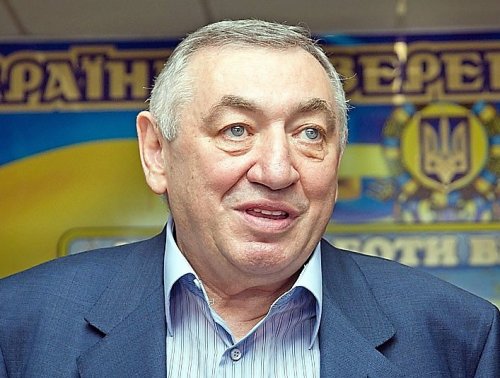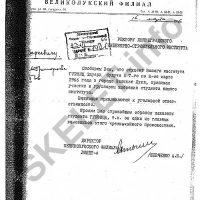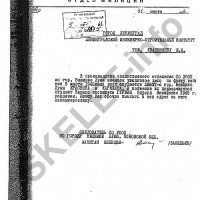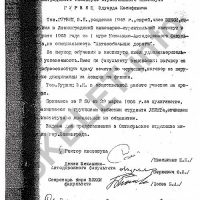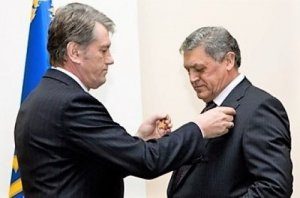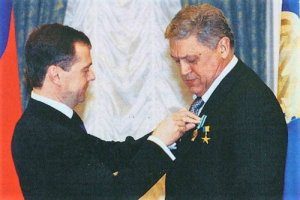Eduard Gurvits: the bloody mayor-ruiner of Odessa. PART 1
We say “Odessa”, but we remember its twice-mayor Eduard Gurvits, who over the ten years of total rule of the city left in it many scars, ruins, corpses and crippled destinies. The city, which was the pearl of the Black Sea, was devastated by groups of bandits and swindlers. Nevertheless, Gurvits still has no intention of returning to the chair of the mayor or at least placing his reliable person in it in order to more than make up for his expenses. But this causes sincere surprise: is it really possible that after Odessa was robbed for 25 years by the teams of successive Gurvits, Bodelan and Trukhanov, there is still something left in it to “saw up” and rip off?
Eduard Gurvits. KGB history
Gurvits Eduard Iosifovich was born on January 20, 1948 in Mogilev-Podolsky (Vinnitsa region), in the family of Maria Naumovna Bershtein (1919-1994) and Joseph Ilyich Gurvits (1913-1957). According to Eduard Gurvits, his father was arrested following a denunciation by his colleagues and sentenced to 9 years under Article 58, his health was severely damaged in the camp and therefore he died early from heart disease at the age of 44. This, according to Gurvits the son, made him a staunch anti-communist from childhood – in any case, this is what he always tried to explain his irreconcilable hostility towards his sworn opponent Ruslan Bodelan. However, given that the real reason for this enmity was completely different (and this is precisely what Skelet.Info Now he will tell you in detail), doubt arises about the veracity of Hurwitz’s words. And how will the communist-hating son of a repressed person explain the rumors about his work for the KGB under the operational pseudonym “Vesely”, which consisted of the same denunciations of “anti-conscience-minded people” to which his own father once fell victim?
These rumors are connected with one high-profile incident from Hurwitz’s turbulent youth, which he prefers to remain silent about. In 1965 (and not in 1966, as written in his biography), young Komsomol member Eduard Gurvits (allegedly an anti-communist) entered the first year of the road transport department of the Leningrad Civil Engineering Institute (LISI). According to the “wolf” description given to him later, he studied “every time”, and he behaved noisily and defiantly in class – in a word, with such a character, he belonged in a provincial vocational school, and not in one of the oldest and most prestigious universities in the country . And then on March 8, 1966, Eduard Gurvits found himself in the city of Velikiye Luki (Pskov region), where the branch of the Leningrad Institute of Railway Engineers (LIIZHT) is located, on the night of March 9, under the windows of a student dormitory, he “took part in a group beating” of a student of this university. The rector of LISI was notified in writing by both the Velikiye Luki police who detained the brawler and the management of the institute where the beaten student studied (see documents). As a result, by order No. 50 of March 26, 1966, Eduard Gurvits was expelled from LISI “with eviction from the hostel.”
Gurvits was given a short (2-3 years) but real sentence for hooliganism, since the incident was not hushed up, but the case was allowed to proceed. But then a strange thing happened: a month later the criminal case was closed, and Gurvits was reinstated at LISI – giving him back both his place in the dormitory and even his scholarship, limited to a severe reprimand. The reason for his restoration was formulated in the most abstract way: “in connection with the receipt of additional materials,” which then usually meant a letter “from above” or from the KGB. But young Gurvits did not have high connections, which means that rumors that he expressed a desire to cooperate with state security, having received the “call sign” Vesely, have good reason.
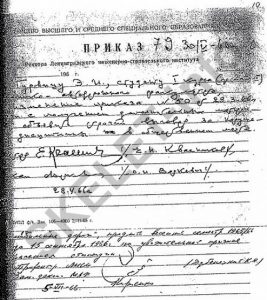 But in this “KGB story” something remained unsaid. The fact is that, sitting in a cell in a pre-trial detention center, a young hooligan could not just call an investigator and say “I want to work for the KGB.” And if he did, he would simply get hit in the neck. There was only one option: only the KGB could reach the arrested Gurvits, and not vice versa. This means that either the crime itself (the beating of a student) was associated with certain unnamed circumstances that attracted the state security authorities to the case, or the student Gurvits was already working for the KGB before this incident.
But in this “KGB story” something remained unsaid. The fact is that, sitting in a cell in a pre-trial detention center, a young hooligan could not just call an investigator and say “I want to work for the KGB.” And if he did, he would simply get hit in the neck. There was only one option: only the KGB could reach the arrested Gurvits, and not vice versa. This means that either the crime itself (the beating of a student) was associated with certain unnamed circumstances that attracted the state security authorities to the case, or the student Gurvits was already working for the KGB before this incident.
A somewhat strange fact from his biography, which may also be associated with the KGB, is his military service after graduating from university in 1971-72. A certified road construction specialist suddenly found himself as a private in the Strategic Missile Forces, although his best place was as a lieutenant in a construction battalion. It is possible that this point is, how to put it, false information, and in reality Eduard Gurvits did not serve as a private at the missile base.
Eduard Gurvits. “Shabashki” and “roof”
In 1973-77 a young construction specialist, Gurvits, worked in the construction departments of the city of Balti (Moldova), where he became acquainted with such a phenomenon of the shadow Soviet economy as “shabashki”. Having received his first big “left” money for his work, Hurwitz for the first time saw his meaning in life. However, as a person with a broad outlook, who does not stop at small things, he soon realized that he could make even more money by being not the builder himself, but the organizer of the “gangs.” Which is what he did over the next 10 years. Under the modest entry “he worked in various construction organizations in Odessa from 1977 to 1987,” Gurvits’ biography hides his career as a coven-maker known throughout the region – it was in this role that he was known until the early 90s.
At the same time, he laid the foundations for his future career as a mayor. Over the course of 10 years of “coven”, Gurvits became acquainted with all the chairmen of collective farms and district executive committees in the region, and established business acquaintances in the executive committee and city committee of Odessa. Subsequently, some of these old acquaintances (for example, Leonid Titovich) will become his “personnel reserve”, and he will “cut” with them the budgets of independent Ukraine. And the then chairman of the Odessa City Executive Committee, Valentin Simonenko, with whom Gurvits entered into mutually beneficial contracts for construction work (with good kickbacks), became his ladder to the city government.
-
Valentin Symonenko was also awarded by Ukrainian President Yushchenko…
-
…and Russian President Medvedev (*criminal)
But between the illegal “coven” and his first position in the city government of Odessa, Gurvits was engaged in “cooperation” for three years (1987-90). His first official enterprise was the Restorer cooperative, which essentially became a semi-legal way of registering “covens.” Then the Ecopolis company appeared, created on the basis of the Odessa Ecoclub, to which Eduard Gurvits once showed up with a business proposal. Perhaps, not only with business, since the “Ecoclub” was something like the first “perestroika” cultural and political beau monde, and the KGB had a keen interest in it.
Formally, “Ecopolis” was designed as a multidisciplinary creative studio, in fact it was engaged in everything: the same construction contracts, the production of whitewash (paint) in the old workshop, the resale of onions, which were grown for Gurvits on the collective farm fields by the Koreans – which he never paid them, “throwing it at the money.” But with each passing month, Ecopolis deviated more and more into trade, including smuggled goods, of which more and more came to Odessa. Moreover, a significant part of the smuggling that passed through Ecopolis belonged to Odessa organized crime groups.
Gurvits became closely acquainted with the Odessa “authorities” when he began to “run wild” in the city. If somewhere on collective farms it was possible to negotiate with local hooligans for a pair of imported jeans or half a box of vodka, then in Odessa the “lads” vigilantly monitored all types of “unearned income” and took from them at the established rate. This is how Gurvits first acquired a criminal “roof.” But he didn’t just regularly pay a percentage of the “coven”, but became close to the leaders of the criminal world of Odessa. Whether he wanted to expand the boundaries of his business himself, or whether he was carrying out an assignment from his KGB curators, Gurvits occupied a social niche between an ordinary semi-shady businessman and a criminal “businessman.” That is, without being directly a member of the organized crime group, he took part in the business of the groups as a “junior partner.”
In the late 80s, Gurvits sought direct contacts with Viktor Kulivar himself (nickname Karabas), the king of the criminal world of Odessa. But he passed it on to one of his “vassals” Grigory Stoyanov, a former sailor who, together with his brother, created a group of about 40 people. From the late 80s to the mid-90s, Stoyanov was the main power “roof” of Gurvits – and he, in turn, helped him in the struggle for control over key objects in the city.
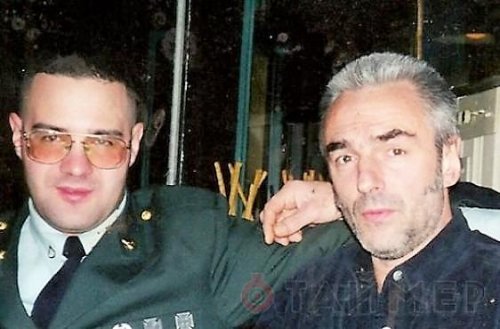
Georgiy Stoyanov (right) with his son Mark
Eduard Gurvits. First position, first trophies
In addition to the criminal “roof,” Gurvits was always looking for a political one. He needed it already during his first elections in 1990. Acquaintances of Gurvits said that at that time he sought to obtain the mandate of a people’s deputy, and even for the sake of this he created for himself the image of a political dissident (this is where his repressed father came in handy), and established contacts with opposition (as they called them “democratic”) parties. For him, this was not difficult, since among the members of the Eco-Club there were many urban eccentrics who were interested in politics, including “professional democrats”; even then they included “Rukhists”, “greens”, and “republicans”. In the 1990 elections, Ecoclub and Ecopolis nominated 37 candidates! Gurvits was persuaded not to immediately get involved in big politics, but to choose a leading position for himself. So he won the elections to the Zhovtnevy District Council (running as a “green”). And then, with the support of the “democrats” from below, the city mayor Simonenko from above, the Odessa organized crime group from around the corner and the “gifts” distributed to the deputies, was elected as its chairman and head of the district executive committee.
Hurwitz immediately settled into his first position. Already in September 1990, with the help of Valentin Simonenko, he reassigned RSU-1 and RSU-5 (with all real estate and equipment) to the ownership of his district council, and also won some economic independence for his district. This was the right to collect rent from district funds, the right to register small enterprises, create joint ventures (this was very important for export-import operations), as well as the right to transfer state property into collective property (the first step towards privatization). And first of all, Gurvits donated an entire house on Lastochkina Street as a gift to the “Ecoclub”: officially for the office of the “environmental inspection”, in reality the building became the property of a public organization.
But in a year he will take this gift back, declaring the house unsafe – and break up with his friends from the Eco-Club. And it will not only be that with the collapse of the USSR and the abolition of the KGB, no one has yet needed the services of agent Vesely – which means he no longer needed to endure and give gifts to elderly poetesses and unbalanced losers. The point was also that in the 1991 presidential elections, Eduard Gurvits decided to unequivocally support the candidate from the “People’s Movement” Vyacheslav Chernovol, in fact heading his election headquarters in Odessa. And the majority of the Ecoclub members spoke out against Vyacheslav Maksimovich, and were so stubborn in their decision that they had the imprudence to quarrel with Eduard Iosifovich. However, according to sources Skelet.Infoa much more significant reason for their quarrel was Hurwitz’s violent business activities and the understanding that he was only using naive romantic eccentrics for his own purposes. They apparently believed that they would expel him from their ranks – but instead he himself expelled them from the premises. “People are not driven by ideals, but by fear and money!” – Eduard Gurvits once said.
Why Chernovola? At that time, with a rating of up to 30%, the leader of Rukh was not only the main alternative to Kravchuk, but also a very real presidential candidate. Gurvits correctly calculated that if Chernovol wins, he will be the only person in Odessa who has provided such support to the future president – and then he will be able to claim very large and fat dividends. Well, so that his future success would depend not only on the too principled Chernovol, Gurvits developed vigorous activity to get closer to all members of the “Rukh line” – and he especially succeeded in this with Vladimir Yavorivsky, who became Gurvits’ friend and business partner. In the future, when Gurvits became the mayor of Odessa, he donated several expensive historical objects of Odessa real estate to the Union of Writers of Ukraine, which was led by Yavorivsky. And Yavorivsky used them at his own discretion. By the way, their rapprochement could have been facilitated by the fact that Vladimir Yavorivsky himself had been a KGB agent since 1971, working under the pseudonym “Tridolya”. And he not only secretly snitched on fellow writers, but also in 1973, on instructions from the KGB, he organized the collection of signatures of Ukrainian writers on a letter to Yuri Andropov condemning Vasily Stus, Vyacheslav Chernovol and other Ukrainian dissidents. By the way, there is information that after the Stus case, Yavorivsky established an unofficial but confidential relationship with Viktor Medvedchuk.
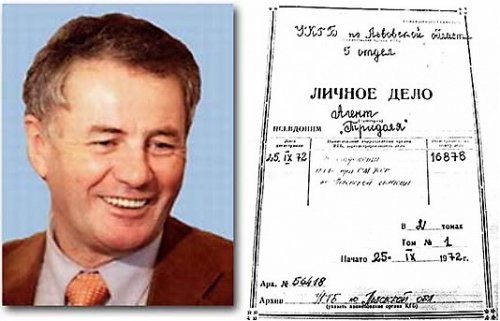
Vladimir Yavorivsky and his “snitch” case
In the 90s, Yavorivsky would leave Rukh and head the Democratic Party (along with other signatories of the letter to Andropov), but at the beginning of 1992 he still had a lot of weight there. And Gurvits immediately took advantage of this to push his protégé Pavel Kudyukin to the post of head of the Black Sea Shipping Company. However, sources reported that Kudyukin was then a protégé not so much of Gurvits himself, but of Odessa organized crime groups and the corrupt city leadership.
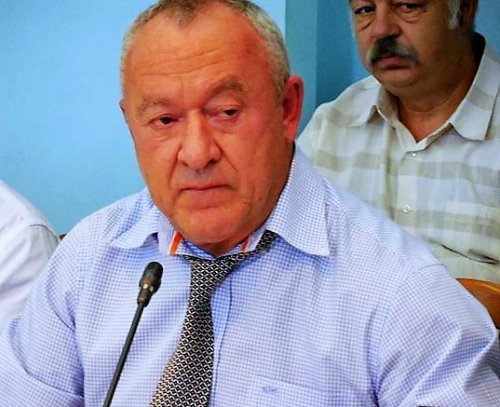
Pavel Kudyukin
Odessa media wrote that when Kudyukin was still studying at the Odessa Higher Marine Engineering School, he was caught stealing personal items from his wardrobe. But he always had a lot of necessary connections, which already at the age of 27 made him a sea captain – and he used his position to transport imported clothes and contraband. In Odessa, Kudyukin knew all the necessary people: from customs officers and city officials, to criminal “authorities” and black marketeers. Therefore, many were interested in Kudyukin heading the private enterprise.
In general, this story began with the fact that the former head of the ChMP Pilipenko supported the State Emergency Committee in August 1991, after which the “national-patriotic forces” began to dribble on Kravchuk’s crown with demands for the resignation of the “communist putschist.” But before the 1991 elections, Kravchuk ignored all these demands, and only then made concessions. But the main contender for the post of head of the ChMP was at first Alexander Vinnitsky (he was supported in Kyiv) and Valery Kravchenko – who, in particular, was supported by the local Odessa “Rukhovites”. Therefore, Gurvits had to jump over their heads: he took Kudyukin to Yavorivsky, and then the three of them went straight to Chernovol – to prove that Kudyukin was the best sea captain and the greatest patriot of Ukraine. And with the support of Chernovol, they headed to Kravchuk. The first president of Ukraine liked Kudyukin: he appointed him head of the private enterprise, and then put him in charge of the scandalous Blasko concern (in which the president’s son Alexander Kravchuk was involved). It ended with the fact that in 1994 Kudyukin fled to Moscow, where in 1995 he was arrested and extradited to Ukraine, spent 3 years in a pre-trial detention center, was sentenced to 10 years in prison – and was released on March 23, 2000 “for health reasons” ( there is information that former Rukhovites worked for him). After that, the “leaning back” Kudyukin first cherished the idea of creating an “Orthodox fleet” (the UOC-MP and Cypriot companies were to become co-owners of the enterprise), and then suddenly acquired start-up capital and started agribusiness in the Kyiv region (PJSC “Berezanskoye”).
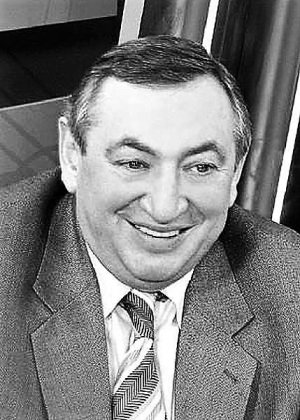
Eduard Gurvits
And here is another story from 1992, already connected with the self-proclaimed Transnistria (PMR). The first official meeting between Gurvits and the president of the self-proclaimed PMR, Igor Smirnov, took place in the summer of 1992. Then a delegation of Ukrainian right-wing politicians headed by Vyacheslav Chernovol went to Tiraspol, where Gurvits was squeezed in – to study the Ukrainian issue of Transnistria. The Rukhovites did not like this question, since they saw in it a “Russian card”. But Smirnov and Gurvits developed a friendly and business relationship. It was reported that Smirnov subsequently traveled to Odessa several times, where he had meetings with Hurwitz, including in restaurants and in a sauna. The result of these meetings was smuggling and corruption operations carried out between the structures of the PMR and Odessa business. Eduard Gurvits participated in them directly, as stated by the former head of the Tiraspol commandant’s office, Colonel Mikhail Bergman.

Eduard Gurvits: the bloody mayor-ruiner of Odessa. PART 1
According to Bergman, in 1992, President Smironov issued a decree instructing the MPR to carry out foreign economic activities through a number of companies, including Ukrainian ones, among which was the joint venture Three Plus Co LTD, which was engaged in cargo transportation. Bergman stated that this enterprise was part of the business structure of Gurvits and his criminal partners, who exported non-ferrous metals and oil products to Europe through Transnistria, and imported contraband, including small arms.
Sergey Varis, for Skelet.Info
CONTINUED: Eduard Gurvits: the bloody mayor-ruiner of Odessa. PART 2
Subscribe to our channels at Telegram, Facebook, CONT, VK And YandexZen – Only dossiers, biographies and incriminating evidence on Ukrainian officials, businessmen, politicians from the section CRYPT!

